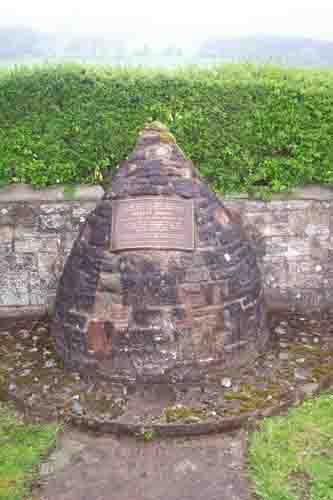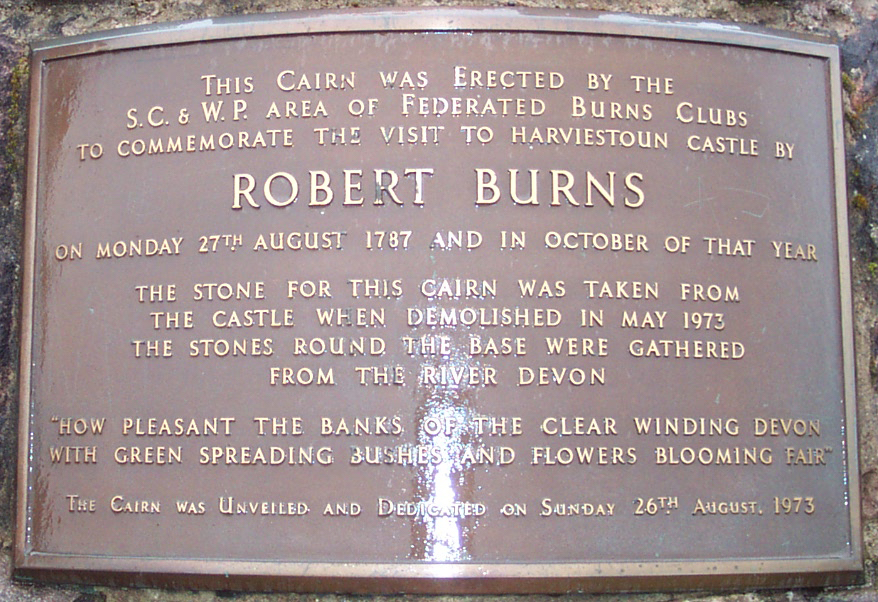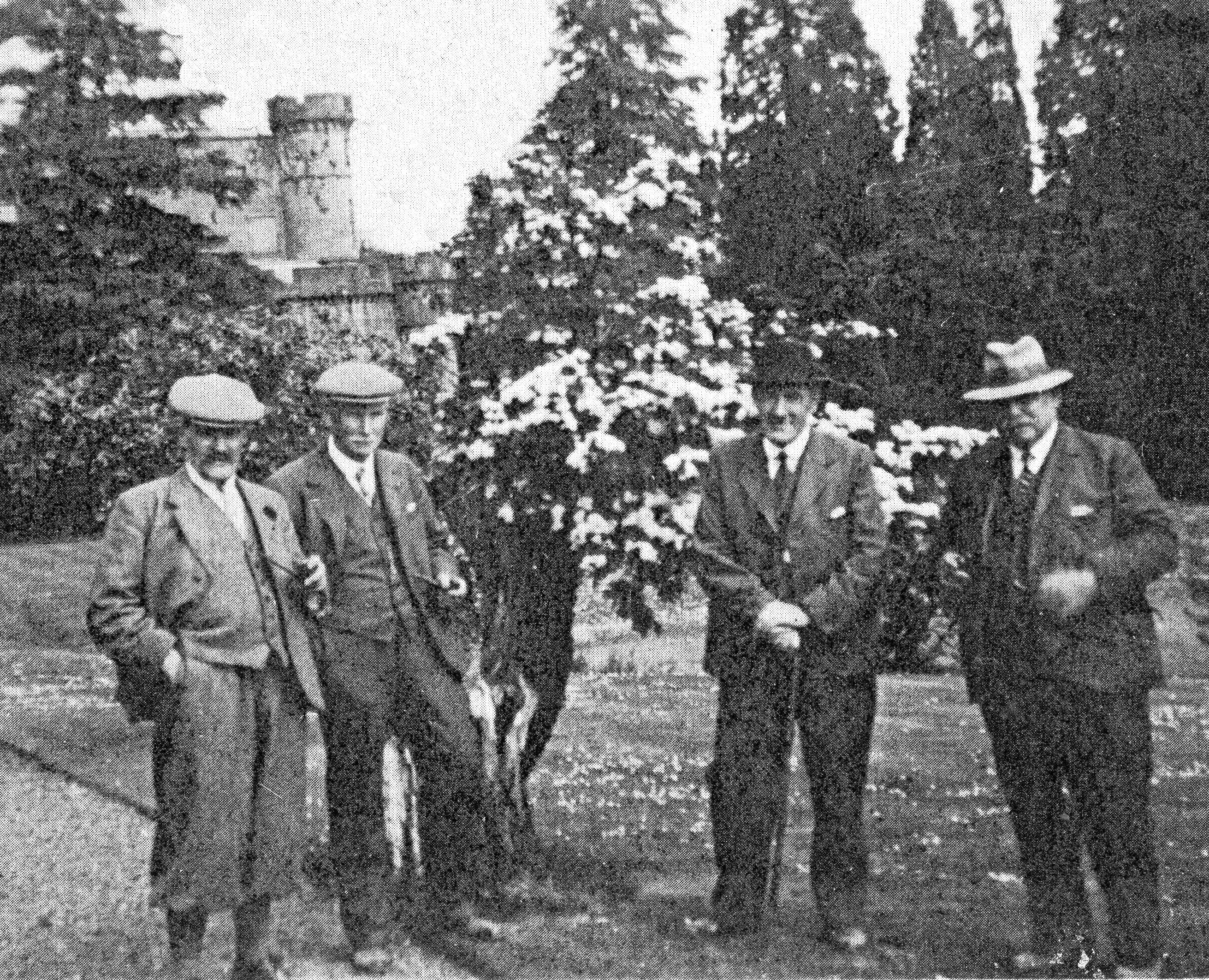Open every weekend from Easter to Christmas. Opening Times: Saturdays 11am to 1pm and 2pm to 4.30pm; Sundays 2pm to 4.30pm

Robert Burns
(1759 – 1796)
Robert Burns Visits Dollar
Researched by Janet Carolan; adapted for web-site
In August 1787 Robert Burns found himself at Stirling and took the opportunity to ride to Harviestoun near Dollar. Harviestoun was owned by John Tait. When Tait’s wife died, her sister Mrs Hamilton and family, including the attractive Charlotte Hamilton, came to keep house for him. Burns was a friend of Mrs Hamilton’s step-son Gavin Hamilton, a lawyer in Ayrshire, and it was this connection that led Burns to visit Dollar. A beautiful and vivacious young cousin, Peggy Chalmers, whom Burns had met in Edinburgh, also lived at Harviestoun.
However, Peggy was not at Harviestoun the day Robert Burns visited. During the afternoon Burns and Charlotte (Hamilton’s step-sister) went for a ride around the local area, taking in Cauldron Linn and Rumbling Bridge. The following day Burns wrote the following to his friend Gavin Hamilton: ‘Yesterday morning I rode from this town [Stirling] up the meandering Devon’s banks, to pay my respects to some Ayrshire folks at Harvieston. After breakfast, we made a party to go and see the famous Caudron-linn, a remarkable cascade in the Devon, about five miles above Harvieston; and after spending one of the most pleasant days I ever had in my life, I returned to Stirling in the evening.‘
Burns meets Peggy again
Burns already knew Peggy Chalmers. He had met her several times in Edinburgh at the home of another poet, and knew her previously from home in Ayrshire. She could play the piano and sing, and he became one of her many admirers.
Burns returned to Harviestoun in October when he stayed about ten days, and to his delight Peggy was also there. He was accompanied by his friend Dr James Adair, who later married Charlotte.
Although Burns inspected the dramatic Castle Campbell, Cauldron Lynn and Rumbling Bridge, it was the two attractive girls who inspired his muse. For Charlotte he wrote ’The Banks of the Devon’ and for Peggy several poems, including ’Fairest Maid on Devon Banks’. Burns was consumed with love for Peggy, and immortalised her in ‘Young Peggy Blooms’ and ‘My Peggy’s Charms.’ Later Peggy admitted that Burns had proposed to her, but that she had rejected him. He wrote the song ‘The Banks of the Devon’ that same year which immortalised his visit and contains the lines:
“But the boniest flow’r on the banks of the Devon.
Was once a sweet bud on the braes of the Ayr.”
Burns never really got over Peggy and in February the following year Burns married Jean Armour. But he never put Peggy out of his heart and in September wrote to her: ‘When I think that I have met with you and have lived more of real life with you in eight days than I can do with almost anybody I meet in eight years – when I think on the improbability of meeting you again in this world again – I could sit down and cry like a child.’ In December, Peggy married a rich banker, Lewis Hay.
Six years later, Burns’ wrote his final poem. ‘Fairest Maid on Devon Banks‘, written a few days before his death, was about Peggy.

Cairn commemorating Burns’ visits, erected in 1973, using stone from the recently demolished Harviestoun Castle and also from the River Devon.

Detail of plaque on Cairn, erected by Federated Burns Clubs to commemorate his visits to Harviestoun.

Hawthorn tree said to have been planted by Robert Burns on his visit to Harviestoun in October 1787. (Harviestoun in background)
Photograph: Mr Fraser, Dollar Burns Club, with members of Ayr Burns Club.
The Banks of Devon
How pleasant the banks of the clear winding Devon,
With green-spreading bushes, and flowers blooming fair!
But the bonniest flower on the banks of the Devon
Was once a sweet bud on the braes of the Ayr.
Mild be the sun on this sweet blushing flower,
In the gay rosy morn, as it bathes in the dew!
And gentle the fall of the soft vernal shower,
That steals on the evening each leaf to renew.
O spare the dear blossom, ye orient breezes,
With chill hoary wing, as ye usher the dawn!
And far be thou distant, thou reptile, that seizes
The verdure and pride of the garden or lawn!
Let Bourbon exult in his gay gilded lilies,
And England, triumphant, display her proud rose:
A fairer than either adorns the green valleys,
Where Devon, sweet Devon, meandering flows.
Fairest Maid On Devon Banks
Fairest maid on Devon banks,
Crystal Devon, winding Devon,
Wilt thou lay that frown aside,
And smile as thou wert wont to do?
Full well thou know’st I love thee, dear!
Could’st thou to malice lend an ear?
O! did not love exclaim, Forbear,
Nor use a faithful lover so.
Then come, thou fairest of the fair,
Those wonted smiles, O let me share;
And by thy beauteous self I swear
No love but thine my heart shall know.
Fairest maid on Devon banks,
Crystal Devon, winding Devon,
Wilt thou lay that frown aside,
And smile as thou wert wont to do?
